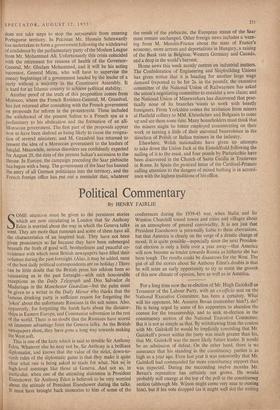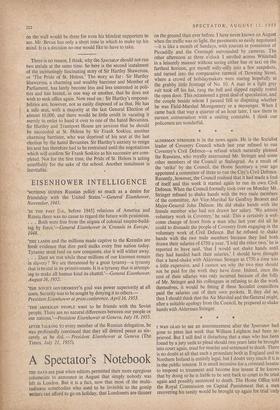Political Commentary
BY HENRY FAIRLIE sOME attention must be given to the persistent stories which are now circulating in London tha't Sir Anthony Eden is worried about the way in which the Geneva talks went. They are more than rumours and some of them have all the characteristics of an inspired leak. They have not been given prominence so far because they have been submerged beneath the froth of good will, brotherliness and peaceful co- existence with which most British newspapers have filled their columns during the past fortnight. (Also, it may be added, most of the best daily political correspondents are on holiday.) There can be little doubt that the British press has seldom been so nauseating as in the past fortnight—with subh honourable exceptions as the Daily Telegraph and Don Salvador de Madariaga in the Manchester Guardian—but the palm must be given to a writer in the Daily Mirror who thinks that the famous drinking party is sufficient reason for forgetting the `jokes' about the unfortunate Russians in the salt mines. Also, apparently, for forgetting the harsh facts about the dictator-. ships in Eastern Europe, and Communist subversion in the rest of the world. There is no doubt that the Russians have scored an immense advantage from the Geneva talks. As the British newspapers show, they have gone a long way towards making the West soft. t This is one of the facts which is said to trouble Sir Anthony Eden. Whatever else he may not be, Sir Anthony is a brilliant diplomatist, and knows that the value of the strict, down-to- earth rules of the diplomatic game is that they make it quite clear what one is being asked to made for what. Not sq. in high-level meetings like those at Geneva. And not so, in particular, when one of the attending statesmen is President Eisenhower. Sir Anthony Eden is believed to be very worried about the attitude of President Eisenhower during the talks. It must have brought back memories to him of some of the conferences during the 1939-45 war, when Stalin and Sir Winston Churchill tossed towns and cities and villages about in an atmosphere of general conviviality. It is not just that President Eisenhower is personally liable to these aberrations. but that America is clearly on the verge of a drastic change of mood. It is quite possible—especially since the next Presiden- tial election is only a little over a year away—that America will now become as tender towards Russia as hitherto she has been tough. The results could be disastrous for the West. The gist of all the stories about Sir Anthony Eden's doubts is that he will seize an early opportunity to try to resist the growth of this new climate of opinion, here as well as in America.
For a long time now the re-election of Mr. Hugh Gaitskell as Treasurer of the Labour Party, with an ex-officio seat on the National Executive Committee, has been a certainty. What will his opponent, Mr. Aneurin Bevan (remember him?), do? He is being urged by some of his supporters to abandon the contest for the treasurership, and to seek re-election in the constituency section of the National Executive Committee. But it is not as simple as that. By withdrawing from the contest with Mr. Gaitskell he would be implicitly conceding that Mr. Gaitskell's power within the party was much greater than his. that Mr. Gaitskell was the more likely future leader. It would be an admission of defeat. On the other hand, there is no assurance that his standing in the constituency parties is as high as a year ago. Even last year it was noteworthy that Mr. Gaitskell had commanded far more constituency support than was expected. During the succeeding twelve months Mr. Bevan's reputation has certainly not grown. He would probably still emerge at the top of the poll in the constituency section (although Mr. Wilson might come very near to ousting him), but if ,his vote dropped (as it might well do) the writing on the wall would be there for even his blindest supporters to see. Mr. Bevan has only a short time In which to make up his mind. It is a decision no one would like to have to take.
There is no reason, I think, why the Spectator should not run two serials at the same time. So here is the second instalment of the increasingly fascinating story of Sir Hartley Shawcross, or 'The Pride of St. Helens.' The story so far : Sir Hartley Shawcross, a charming and wealthy barrister and Member of Parliament, has lately become less, and less interested in poli- tics and has hinted, in one way or another, that he does not wish to seek office again. Now read on : Sir Hartley's responsi- bilities are, however, not as easily disposed of as that. He has a safe seat, with a majority at the last General Election of almost 16,000. and there would be little credit in vacating it merely in order to hand it over to one of the hated Bevanites. Sir Hartley and Trankport House are anxious that he should be succeeded at St. Helens by Sir Frank Soskice, another charming barrister, who was deprived of his seat at the last election by the hated Bevanites. Sir Hartley's anxiety to resign his seat has therefore had to be restrained until the negotiations which will confirm Sir Frank Soskice as his successor are com- pleted. Not for the first time, the Pride of St. Helens is acting unselfishly for the sake of the school. Another instalment is inevitable.



































 Previous page
Previous page